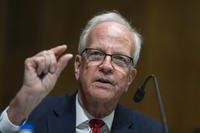It's not often anyone on the House Armed Services Committee invokes the constitution and the rule of law, but today's hearing on the F-22 featured repeated mentions of the founding document by frustrated lawmakers who knew the Pentagon had outflanked them on the controversial program.
"You are acting in defiance of the law and the will of Congress," Rep. Phil Gingrey (R-Ga.) hurled at John Young, undersecretary of defense for acquisition, technology and logistics.
"The defense bill is the defense bill and you will obey what it says -- period," a moderately unhappy Rep. Neil Abercrombie, chairman of the House Armed Services airland subcommittee, told Young.
Abercrombie and members of both parties made it very clear to Young that they thought the Pentagon had flouted both the spirit and the intent of the law, which directed that $140 million be spent on advanced procurement. The money would make it possible to fund an additional 20 F-22s and, perhaps more importantly, to keep the production lines open.
The Pentagon countered with plans to buy four more F-22s in the next supplemental spending bill and Young announced that he has approved Air Force spending of as much as $50 million for advance procurement.
The Acquisition Decision Memorandum (ADM) approved by Young allows for the procurement of parts support for four aircraft beyond the 183 total F-22’s that DoD has already contracted for.
Young pointed out in a Nov. 11 statement that the draft Pentagon budget for 2010 does not include money for F-22s. The ADM provides “a bridge to a January decision by the next administration” on whether and how many more F-22s to buy, up to the congressionally mandated ceiling of $140 million for up to 20 F-22, Young said at the time.
During today's hearing, Young told Abercrombie and his colleagues that the Pentagon acted because it did not want to tie the hands of the Obama administration. But the effect of the decision, according to congressional aides, is to make any expansion of the F-22 buy highly unlikely.
The stakes for some House members are high. Gingrey told reporters after the hearing that a total of 25,000 jobs depend directly on the F-22 program, with another 70,000 thousand jobs affected by the program's end. To show how eager F-22 maker Lockheed Martin is to keep the program going, a congressional aide said the company started funding six of its vendors out of its own money in July to make sure they kept making 142 key parts.
But Congress appears to have been outfoxed. "They really have us where they want us," a congressional aide said after the hearing. "[Deputy Defense Secretary Gordon] England and [Defense Secretary Robert] Gates do not want to fund the F-22 and they've got us." By the time Congress could take any action to force the Pentagon to comply with the law -- several months -- the decision will already be in the hands of the new administration.








